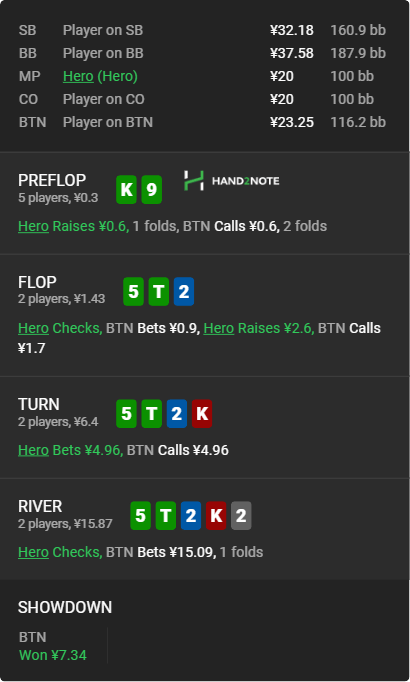Ivan "A_NAVI40K_K" analyzed his hand played against a passive amateur, and coach Alexander "shpr0ta" commented on his thoughts and answered questions.

Standard open from early position with K9s, fish calls on the button – 58/6.2 (can be classified as passive), 3-bet – 5.2, WTSD – 24, WSD – 46, WWSF – 42, street aggression numbers – 26/46/48 , but keep in mind that there are only 417 hands on the opponent.
Flop
On the flop, my strategy is divided into bet, check-raise, and check-call. I try to balance equally. Against a fish, it is preferable to bet immediately, especially against a passive one, because it is unlikely that he will bluff if I don't continuation bet. I could have pushed my equity for 1/3-1/2 pot, but this time I decided to check-raise for some reason. Sizing 3x. The opponent calls. After that, his range appears to me as some kind of pair + draw/overcards. Also, do not rule out slowplay sets.
Turn
I improved to top pair + flush draw and decided to continue the aggression in order to prevent him from seizing the initiative and realizing equity for free, and also getting value from weaker made hands. He just calls again, which makes him less likely to have strong hands like two pair or better.
River
It can be said that a blank has come, which, moreover, due to the effect of blockers, makes the probability that the opponent has two pair or a set even lower. No draws hit and I decide to go for a bluff catch. Villain shoved almost instantly, which made me doubt that catching a bluff is a good idea, after all, he is passive, even though aggression increases by the river. In addition, I block a decent part of the possible bluffs (flush draw + Q9, J9). However, there are still AJ, AQ, QJ, Q9, J9, and all flush draws. From value hands, he will very rarely have full houses – 55, TT, K2s, 52s; two pairs; top pair by KJ+. Having spent the entire available time bank (10-12 seconds) on reflection, I decided not to risk it and threw it away.
The opponent showed a bluff – a missed combo draw AcQc. I was overcome with a feeling of annoyance since it was already the end of the session, and calling this all-in could made a profit on the session for me.
What was the best way to play my hand from the flop? Is it profitable to call all-in on the river?
Coach's comment
Alexander "shpr0ta"
On the flop, my strategy is divided into bet, check-raise, and check-call. I try to balance equally. Against a fish, it is preferable to bet immediately, especially against a passive one.
Agree. If against a reg you use a strategy with branches of bet, check-call, and check-raise, then against a fish, I think it is worth simplifying the hand. Especially against a fish who plays as straight forward as possible. I would push the equity myself for a favorable sizing to avoid getting a big bet from my opponent. Also, check-raising against a passive fish has too little fold equity to bluff often.
I improved to top pair + flush draw and decided to continue the aggression in order to prevent him from seizing the initiative and realizing equity for free, and also getting value from weaker made hands. He just calls again, which makes him less likely to have strong hands like two pair or better.
I like. Strong drive. Fish doesn't fold worse hands, eg second pair + doesn't fold strong draws in position. We have the lightest value bet.
It can be said that a blank has come, which, moreover, due to the effect of blockers, makes the probability that the opponent has two pair or a set even lower. No draws hit and I decide to go for a bluff catch.
I don't like the idea of bluffing the top of the range. For this, we have a pure bluffcatcher. Top pair is hardly such a hand. I would value bet.
Villain shoved almost instantly, which made me doubt that catching a bluff is a good idea.
Actually, this is an interesting note. Usually, with a strong hand, people think. Trying to figure out how to get the most efficient way. Snap decisions are rarely strong hands. This comes from my personal experience and the experience of students.
In addition, I block a decent part of the possible bluffs (flush draw + Q9, J9)
I would not take the effects of blockers against the fish so seriously. The fact is that fish in general have a poor understanding of their range. Even if a fish is passive and doesn't bluff often enough, he will have far more empty hands in his range than a reg in a similar situation. So even if he only bluffs with a small part of his range, there will still be a lot of bluffs. But more often than not, the fish just bet with anything that doesn't have showdown value. Even if the amateur is passive.
The opponent showed a bluff – a missed combo draw AcQc. I was overcome with a feeling of annoyance since it was already the end of the session, and calling this all-in could bring it into plus.
Do not be upset if somewhere along the line you fold a bluffcatcher and see a bluff. Overfolding with a bluff catcher is usually the right move. But here, most likely, you misjudged the equity of your hand. In fact, it is not a bluff catcher against a fish. Checking the river with such a strong hand against an amateur is more of a slow play.











